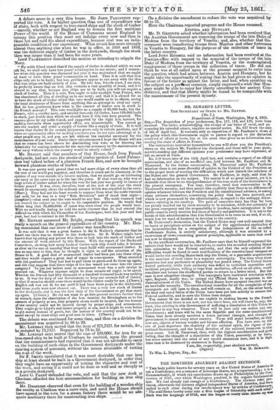MR. SEWARD'S LETTER.
THE SECRETARY OF STATE TO MR. DAYTON.
(No. 7.)
Department of State, Washington, May 4, 1861. SIR,—The despatches of your predecessor, Nos. 117, 119, and 120, have been received. The latter, acknowledging the receipt of our letter of recal, and an- nouncing his intended return, requires no special notice. No. 117 bears the date of 5th of April last. It contains only an exposition of Mr. Faulkner's views of the policy which this Government ought to pursue in regard to the disturbed condition of affairs at home, but at the same time gives us no information con- cerning the state of affairs in France.
instructions nstructions heretofore transmitted to you will show you the President's views on the subject Mr. Faulkner has discussed, and these will be your guide, notwithstanding any different opinions your predecessor may have expressed, or- left on record at Paris.
No. 119 bears date of the 15th April last, and contains a report of an official conversation, and also of an unofficial one, held between Mr. Faulkner and M. Thouvenel. In the former conversation, M. Thouvenel asked Mr. Faulkner whether there is not some diversity of opinion in the Cabinet of the President as to the proper mode of meeting the difficulties which now disturb the relations of the States and the general Government. Mr. Faulkner, in reply, said that he had no information on the subject. The matter is of no great moment, yet it is. desirable that there be no misapprehension of the true state of the Governmerd the present emergency. You may, therefore, recal that conversation to M. Thouveners memory, and then assure him explicitly that there is no difference of opinion whatever between the President and his constitutional advisers, or among those advisers themselves, concerning the policy that has been pursued, and which is now prosecuted by the administration, in regard to the unhappy distur- bances existing in the country. The path of executive duty has thus far been too plainly marked out by stern necessity to be mistaken, while the solemnity of the great emergency and the responsibility it involves, have extinguished in the public councils every emotion but those of loyalty and patriotism. It is not in the hands of this administration that this Government is to come to an end, if at all, much less for want of harmony in devotion to the country. M. Thouvenel's declaration, that the United States may rest well assured that no hasty or precipitate action on the subject of the apprehended application of the insurrectionists for a recognition of the independence of the so-called Confederate States, is entirely satisfactory, although it was attended by a reservation of views concerning general principles, applicable to cases that need not now be discussed.
In the unofficial conversation, Mr. Faulkner says that he himself expressed the opinion that force would not be resorted to, to coerce the so-called seceding States into submission to the Federal authority, and that the only solution of the difficulties would be found in such modifications of the constitutional compact as would invite the seceding States back into the Union, or a peaceable acquiescence in the assertion of their claim to a separate sovereignty. The time when these questions had any pertinence or plausibility has passed away. The United States waited patiently, while their authority was defied in turbulent assemblies and insidious preparations, willing to hope that mediation, offered on all sides, would conciliate and induce the disaffected parties to return to a better mind. But the case is now altogether changed. The insurgents have instituted revolution with open, flagrant, deadly war, to compel the Chited States to acquiesce in the dismemberment of the Union. The United States have accepted the civil war as an inevitable necessity. The constitutional remedies for all the complaints of the insurgents are still open to them, and will remain so. But, on the outer hand, the land and naval forces of the Union have been put into activity to restore the Federal authority, and to save the Union from danger. You cannot be too decided or too explicit in making known to the French. Government that there is not now, nor has there been, nor will there be, any, the least, idea existing in this Government of suffering a dissolution of this Union to take place in any way whatever. There will be here only one nation and one Government; and there will be the same Republic and the same constitutional Union that have already survived a dozen national changes. and changes of government in almost every other country. These will stand hereafter, as they now are objects of human wonder and human affection. You have seen on the eve of your departure the elasticity of the national spirit, the vigour of the national Government, and the lavish devotion of the national treasures to this great cause. Tell M. Thouvenel, then, with the highest consideration and good feeling, that the thought of a dissolution of this Union, peaceably, or by forcer has never entered into the mind of any candid statesman here, and it is high. time that it be dismissed by statesmen in Europe.
I am, Sir, respectfully, your obedient servant, (Signed)






























 Previous page
Previous page